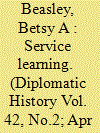| Srl | Item |
| 1 |
ID:
158701


|
|
|
|
|
| Summary/Abstract |
Recently declassified archival materials permit the revelation of a previously unknown element of the early Cold War. Specifically, U.S. officials worried about an electro-magnetic attack by the Soviet Union, using hundreds of radio transmitters, on worldwide communications in advance of or in conjunction with the outbreak of general war.
|
|
|
|
|
|
|
|
|
|
|
|
|
|
|
|
| 2 |
ID:
158700


|
|
|
|
|
| Summary/Abstract |
This article examines the U.S. diplomatic mission in Vietnam’s management of the American press during the later stages of the Franco-Viet Minh War. It contends that managing the American press formed an integral part of the mission’s effort to sustain France’s war in Vietnam.
|
|
|
|
|
|
|
|
|
|
|
|
|
|
|
|
| 3 |
ID:
158702


|
|
|
|
|
| Summary/Abstract |
Using recently declassified government documents, this essay explores the Ronald Reagan administration’s economic war on the Soviet Union in 1982. The evidence shows the administration attempted to coerce West European cooperation with policies intended to undermine the Soviet economy. But U.S. allies forced the administration to retreat.
|
|
|
|
|
|
|
|
|
|
|
|
|
|
|
|
| 4 |
ID:
158698


|
|
|
|
|
| Summary/Abstract |
During the Cold War, oil and oilfield services companies recruited international students to study engineering and business in Houston. Oilfield services executives used education to present their new global corporate reach as benevolent and nonthreatening for both American workers and citizens of oil-rich nations in a moment of post-colonial upheaval.
|
|
|
|
|
|
|
|
|
|
|
|
|
|
|
|
| 5 |
ID:
158703


|
|
|
|
|
| Summary/Abstract |
In 2010, U.S. Secretary of State Hillary Clinton announced her goal of “transforming both State and USAID,” the U.S. Agency for International Development, in order to “build up our civilian power.” Declaring that “non-state actors … are playing an ever-greater role in international affairs,” Secretary Clinton was keen to “leverage civilian power by connecting businesses, philanthropists, and citizens’ groups … to perform tasks that governments alone cannot.” According to Secretary Clinton, these “forward-deployed” transnational activists would “advance America’s interests and help make a world in which more people in more places can live in freedom.”
|
|
|
|
|
|
|
|
|
|
|
|
|
|
|
|
| 6 |
ID:
158699


|
|
|
|
|
| Summary/Abstract |
This article describes a series of visits by Muslim Moros from the Southern Philippines to the United States between 1904 and 1927. It argues that, situated in relation to one another, these visits demonstrate the tensions of representation in an imperial community and the coproduced character of colonial identities.
|
|
|
|
|
|
|
|
|
|
|
|
|
|
|
|